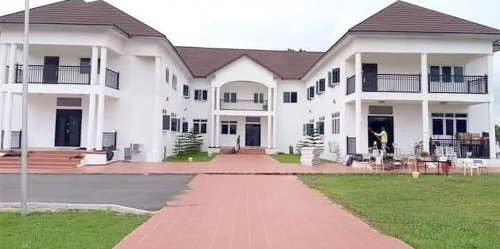The Abanpredease Palace, situated on over 30 acres of land, is the royal residence of the Dormaahene or traditional seat of the Dormaa people.
Perched on a hill surrounded by thick forests, the prestigious palace is also a repository of Dormaa's historical artefacts and royal regalia.
Undoubtedly, the palace, which is located at the heart of Dormaa Ahenkro, the Dormaa Municipal capital, is one of the biggest and most architecturally distinct palaces in the country.
The architectural masterpiece not only houses royal artefacts, but also serves as a living museum of Dormaa's cultural heritage.
Golden stool
At the top of the entrance of the famous palace is a golden stool image, which represents the Dormaa Gold Stool, embodying the authority and heritage of the Dormaahene.
![]()
Osagyefo Oseadeeyo Dr Agyemang Badu II, Dormaahene
A brochure put together by an indigene, Anane Agyei, and obtained during the celebration of the Silver Jubilee of the enstoolment of the Dormaahene, Osagyefo Oseadeeyo Dr Agyemang Badu II and the 2024 Kwafie festival, indicates that the name Abanpredease, was derived from three elements.
These are Aban, which means storey building, Aprede (a cultural ensemble that is performed for the king) and Ase meaning under.
It explains that collectively the words mean under the storey building of Aprede or under the Aprede ensemble's storey building.
"This interpretation reflects the cultural and architectural significance of the royal residence - a place where royal performances by the Aprede ensemble were held, and associated with the grandeur of a storey building, symbolising the royal authority and cultural vibrancy of Dormaa," the brochure explains.
It says together, the name embodies the architectural and cultural heritage of the Dormaa Kingdom.
"More importantly, Abanpredease serves as a vital historical link, connecting Dormaa to its illustrious past of migration and cultural evolution," it states.
It adds that the name symbolises the resilience and ingenuity of the Dormaa people, encapsulating the traditions, leadership and cultural identity that have been preserved through centuries of migration and settlement.
Historical roots
Explaining further that the name Abanpredease reflects its deep historical roots, blending references to storey buildings, cultural ensembles and their shelter beneath the palace, it notes that the palace at Bomaa in the Ahafo Region, one of the ancient towns of the Dormaa people, has retained the name Abanpredease.
It indicates that the two palaces in the traditional Dormaa state bear the name Abanpredease, and that Abanpredease was the historic name of the royal residence of the Dormaahene during the era when the Dormaa Kingdom was situated at Bomaa.
"The significance of Bomaa in the affairs of Dormaa is further exemplified by the fact that the Paramount Queenmother of the Dormaa Traditional Area also serves as the Queenmother of Bomaa.”
"Additionally, the Bomaahene holds the esteemed position of Nifahene at the Dormaa Traditional Area," it said.
Serene environment
On reaching the premises of the palace, one feels nature’s ambience because of the serene lush environment.
The serene environment, architectural masterpiece and the traditional heritage continues to attract visitors, who travel far and near.
A National Service Person, Hollison Owusu Antwi, told the Daily Graphic that he admired the surroundings of the palace because it was always kept clean, as if there were no human activities there.
He said the forest had different kinds of tree species, which provided a natural environment.
"Dormaa Ahenkro, particularly the palace, is unique because of its serene, clean and green environment,” Mr Antwi said.
Cultural haven
A retired educationist and native of Dormaa Ahenkro, Samuel Danso, said the area was always cold because of the forest canopies.
He said the town offered a rich representation of Akan traditions, ancient relics and cultural artefacts, making the town a cultural haven.
Mr Danso, who hails from Dormaa Ahenkro, said the Dormaa Traditional Area stands as a testament to Ghana's rich cultural and historical resilience.
"Indigenous Akan customs and traditional practices thrive alongside modern institutions, creating a unique identity for Dormaa as a cultural and developmental hub," he said.
Writer's email biiya.ali@graphic.com.gh

